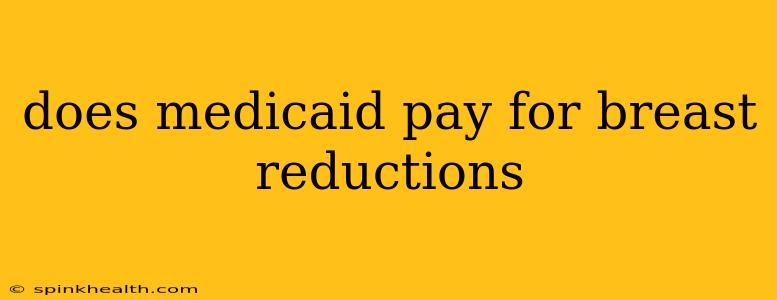Does Medicaid Pay for Breast Reductions? A Comprehensive Guide
The question of whether Medicaid covers breast reduction surgery is a complex one, often dependent on several factors. It's not a simple yes or no answer, and unfortunately, many women find themselves navigating a confusing system. Let's unravel the complexities together, drawing on real-world experiences and official guidelines.
My journey into understanding Medicaid's coverage of breast reductions began with my own research, spurred by a conversation with a friend facing this very dilemma. I quickly discovered that the answer hinges not on a blanket policy, but on a case-by-case assessment. This isn't just about the procedure's cost; it's about proving medical necessity.
What Factors Determine Medicaid Coverage for Breast Reduction?
Medicaid programs vary from state to state. This means that what might be covered in one state could be denied in another. However, the core principle remains consistent: medical necessity. Medicaid, fundamentally, aims to cover medically necessary procedures, not cosmetic ones.
So, what constitutes medical necessity in the context of a breast reduction? This is where the nuances become critical. While many women seek breast reductions for purely aesthetic reasons, others experience significant physical and psychological distress due to excessively large breasts. These conditions often include:
- Back pain: The weight of large breasts can place significant strain on the back, leading to chronic pain and potential long-term damage.
- Neck and shoulder pain: Similar to back pain, the weight can cause discomfort and pain in the neck and shoulders.
- Headaches: The constant strain can trigger frequent headaches.
- Skin irritation and rashes: The constant rubbing of skin under large breasts can lead to infections and irritation.
- Difficulties with physical activity: The weight and discomfort can limit physical activity and participation in daily life.
- Postural problems: The weight can cause poor posture and even affect breathing.
- Psychological distress: The burden of managing large breasts can lead to significant emotional distress, impacting self-esteem and mental health. This is a crucial factor often overlooked.
In essence, Medicaid is more likely to approve a breast reduction if it can be demonstrated to alleviate a significant medical condition, rather than simply improving appearance.
Does Medicaid cover breast reduction for back pain?
Yes, Medicaid may cover breast reduction surgery if the patient can demonstrate that their large breasts are causing significant back pain, and other conservative treatment options have failed. This requires detailed documentation from a physician, including medical history, physical examination findings, imaging studies (if necessary), and a clear explanation of how the surgery will directly address the back pain.
What are the requirements for Medicaid to approve a breast reduction?
The specific requirements vary by state. Generally, a physician must certify the medical necessity of the surgery, usually through detailed documentation and possibly additional support, like physical therapy records demonstrating the failure of conservative treatments. The patient must also meet their state's eligibility requirements for Medicaid.
How do I increase my chances of Medicaid approving my breast reduction?
Thorough documentation is key. Work closely with your doctor to meticulously document your medical history, symptoms, and the impact of your large breasts on your physical and mental well-being. This includes:
- Detailed medical records: These should include a complete medical history, documenting the onset and severity of your symptoms.
- Imaging studies: X-rays, MRIs, or other imaging studies may be needed to support your claim.
- Physical therapy records: If you've undergone physical therapy for back or neck pain, these records can demonstrate that conservative treatments have been unsuccessful.
- Letters of support: Letters from your physician, therapist, or other healthcare professionals can strengthen your application.
Remember, perseverance is crucial. The process might be lengthy and require multiple consultations and appeals. Don't hesitate to seek assistance from patient advocacy groups or legal aid organizations specializing in healthcare access.
The journey to securing Medicaid coverage for a breast reduction can be challenging, but with thorough preparation, clear communication, and persistence, it is possible. Remember to focus on demonstrating the medical necessity of the procedure to improve your chances of approval. The goal is not just a prettier body, but a healthier, more functional one.

